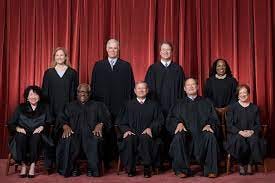Moore v. Harper, Part Two
My previous post on this: defensively pessimistic. The actual outcome: Phew! (Though not exactly a salvaging of democracy.)
The Supreme Court decision announced yesterday in Moore v. Harper is good. The petitioners were arguing—even they can’t possibly believe this!—that back in 1787, when our national founders wrote the constitutional clause on federal elections, they meant to make a state’s legislature supreme over that state’s own constitution for the purposes of federal-election procedures. The petitioners’ purpose was to revive an effort to gerrymander at will on behalf of Trump and the Republican Party, but a 6-3 Court majority has now decided that the petitioners’ totally bogus made-up constitutional story is totally made-up and bogus.
And while three justices voted the other way, the main dissent doesn’t really take the position that the totally made-up bogus story isn’t totally made-up and bogus. So, yeah: good.
When I first posted on this case, after the arguments back in December, I was steeling myself for a majority the other way and washing my hands of the Court in the process. So idiotic and disingenuous is the doctrine the Court was asked to uphold that if it had gone that way, the absurdity of the situation would have been so glaring that there’d really be no way to take the body at all seriously ever again.
So that’s another reason the result is good. Not because I would have finally given all the way up on the Court but because the already failing public sense that the body has a judicious relationship to constitutional interpretation would have reached a new and possibly irrecoverable low.
Maybe that’s why the Court heard this case at all? To make the big “advisory” statement about the nature of constitutional law that Justice Thomas, in his dissent, grumbles the Court shouldn’t be making? I didn’t think this through back in December. Court-watcher types are probably correct in viewing Roberts as highly concerned with the perpetuation of the Court as a crucial and credible governmental institution, and some have noted that Justice Kavanaugh tends to follow Roberts on that kind of thing. So even without Justice Barrett, there would have been a majority in this case (maybe the watchers see Barrett too as concerned with the body’s public integrity?). Kavanaugh’s side-kicky “he’s so right!” concurrence makes a big case for why, contra Thomas, it’s meet and right for the Court to issue a decision in this matter.
I’m not a Court-watcher. I’m a pretty close Court-decision-reader, for a layperson (or maybe because I’m a layperson who can read closely).
But, man, not in this case!



